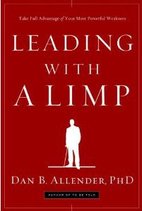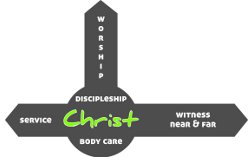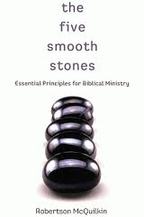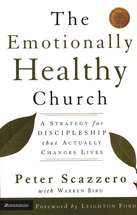 Dan Allender brings an interesting perspective on leadership from the standpoint of both a business organization and a church/Christian ministry in his book “Leading with a Limp.” Most intriguing is the brutal honesty he brings to the cost of leadership. Decision is appropriately equated with death, as each choice cuts off more than just opportunity cost, but also the hopes and dreams of someone on the team. He strips away all the superficial ego-stroking glorious power misconceptions that often come with being a leader and reveals the grim realities of crisis, complexity, betrayal, loneliness, and weariness. Allender's response to this dark side of leadership seems counter intuitive at first. Instead of basing your leadership on your strengths and gifts, to embrace vulnerability and lead out of your weaknesses and failures. (Click "Read More" for full review)
0 Comments
 Therefore, in order to keep me from becoming conceited, I was given a thorn in my flesh, a messenger of Satan, to torment me. Three times I pleaded with the Lord to take it away from me. But he said to me, “My grace is sufficient for you, for my power is made perfect in weakness.” Therefore I will boast all the more gladly about my weaknesses, so that Christ’s power may rest on me. That is why, for Christ’s sake, I delight in weaknesses, in insults, in hardships, in persecutions, in difficulties. For when I am weak, then I am strong. (2 Corinthians 12:7-10) The Achilles heal of strength
Biblical Foundations of Leadership Notes
MIN5310 – Roy King Winter 2011 Other Notes Takers: Larry Epps, Sandra Ladson, Wayne Hill  Blessed are the peacemakers, for they will be called children of God. (Matthew 5:9) I've never thought about the difference between ‘peacemaking’ and ‘peacekeeping’. Dr. King's point that unity is not simply peace rings true. "Peace can be reduced to avoiding engaging in open conflict and yet still be emotionally distant and cold."
Biblical Foundations of Leadership Notes
MIN5310 – Roy King Winter 2011 Other Notes Takers: Larry Epps, Sandra Ladson, Wayne Hill  Though I've never served in the military, I have received a taste of combat training within martial arts. Life in preparation for combat seems to cycle through long hours of waiting and training only to be followed by intense blink-of-an-eye battles. And the cycle often repeats depending the tour of duty.  Christians often interpret various bible passages differently and different ministry methods or theologies emerge. I agree with Roy King that many biblical truths seem to exist in tension with a counterbalancing belief. Sadly, many books and popular speakers seem to market themselves by embracing one consistent extreme while denouncing all opposing views. This not only breeds disunity, but denies elements of the truth inherent to the opposing view that creates the tension. The key is to recognize that the solution normally doesn't lie in compromise, but in a "third" and potentially unknown means of reconciling the two positions. Sadly, the difficult challenge of navigating the Truth to stand in the center of biblical tension seems overlooked. (Roy King - Learning from God HOW to communicate change) I once gave a sermon equating pride to the tumorous looking root of a thorny backyard weed, but I think sometimes we underestimate how deep those roots can go or the forms they can take.
(Roy King - Humility) Volumes could be written to answer this question, but Roy King provides us with a brief four-part response:
It is the demonstration of God’s steadfast love Psalm 107 reveals the consistency of God's love despite the rampant evil and destruction of this world. It is the encounter with God’s redeeming power Psalm 107 continues to reveal that those exposed to God's redeeming love can't help but exude gratefulness and praise for The Lord. It is the source of joy for all people John 16:20-24 reveals that our sorrow will turn to joy and only in the presence of our creator and savior will we fully fulfilled. It confronts and replaces idols who rob their followers of life 1 Thessalonians 1:8-10 reveals that our purpose cannot be found or fulfilled in the things of this world, but only in Jesus Christ. (Roy King - How Does the Church Spread the Gospel) Delight yourself in the LORD, and he will give you the desires of your heart. (Psalm 37:4 ESV)
The first time I heard Psalm 37:4 I somehow only focused on the second half. I followed the world's natural eisegesis that surely God wants me to be happy, so he'll give me whatever personal things my heart desires. (Click "Read More") Ministry in one part of the world rarely mirrors ministry in other parts. Yet, our default perspective tends to only see ministry performed the way we grew up with. Typically Western culture values efficiency, functionality, and productivity which Eastern cultures see as cold and impersonal. So how do we take the gospel to new cultures without without importing our default perspective or compromising the truth?
Biblical Foundations of Leadership Notes
MIN5310 – Roy King Winter 2011 Other Notes Takers: Larry Epps, Sandra Ladson, Wayne Hill  When I worked for an outsourcing firm we were constantly asking firms what their "core functions" were, or what were they in business to do. Any other function they performed was important, but not a key component of their business. These non-core functions could likely be outsourced to a specialist while they freed up time and resources to devote to their core-function. In looking at Church, the question becomes what are the core functions? Once those are defined, everything else is a potential for outsourcing to either a para-church or secular "specialist."  “Leaders lead by helping the people revisit good questions rather than a quest for the one perfect answer.” - Roy King While working with a sales team, we were coached never to "jump to fulfillment." Too often times sales people are eager to provide answers when the client doesn't even know their own problems. "Jumping to fulfillment" inevitably meant money was being left on the table either because the sales person didn't understand the scope of the problem, or the client didn't understand the value of services being offered.
Biblical Foundations of Leadership Notes
MIN5310 – Roy King Winter 2011 Other Notes Takers: Larry Epps, Sandra Ladson, Wayne Hill Roy King Proverb: Anything powerful can also be dangerous  "Yesterday is history, tomorrow is a mystery, but today is a gift. That is why it is called the 'present'."—Master Oogway to Po, Kung Fu Panda The Lord has been revealing to me over the past few months, years that I have an idol in my life...time. I make sacrifices to it, I worship it, it controls my life...  My Sociology professor defined "prayer" as a religious spell, or ritual to affect the outcome of a situation. Taken aback, I realized that he was right...at least, that's what prayer is for a lot of self-proclaimed Christians. A wish list of desires demanded of a supernatural force, thus turning God into a personal genie. Just rub his lamp. "What's my purpose?" has to be one of the most intense introspective questions one can ask. Especially since it's so integrated with the meaning of life. The question begs transcendence since it's difficult to grant meaning or purpose to your own life. For some the answer is unquestionably delivered, such as Isaiah in God's throne room, but for others the quest for one's calling in life is often plagued with doubts. However, just because you haven't had an all defining moment, doesn't mean God hasn't placed a call in your life. God seems to speak in several different ways:
As God makes us more like his son he first develops us internally (Spiritual Disciplines), then develops us in the context of community (Reciprocal Commands), and then develops us as we enter into the lives of others (Community Framework).
In creating disciples, the New Testament authors were intent on bringing about "heart change." Both the "means" and the "end" desire is a heart filled with Faith, Hope, and Love.
 “Where there are no oxen, the manger is clean, but abundant crops come by the strength of the ox.” Proverbs 14:4 (ESV) I'm not sure when or where church became a place for people who had it all together. A biblically healthy church always seems to be elbow deep in the hurt and pains of both its visitors and its members. Thanks to the sins of this world, people have pasts, baggage, and problems that a friendly handshake won't solve. Ignoring the pains will slow everything down, or worse completely derail the ministry. Like in a life saving surgery, you can expect new found strength and vitality through spiritual healing, but it hurts to go under the knife...and the surgeon gets bloody. (Roy King - Intro to Leadership)  Robertson McQuilkin provides a biblical approach to the difficult intersection of theology and ministry within the Church. He identifies the five smooth stones each Christian church must have in order "to prepare for battle against the spiritual Goliaths of the day." It's fascinating to hear how churches live or die by whether they actively teach and practice these five essential dogmas:
 One positive and one negative event and the lesson it teaches from the history of Christianity. How do they apply to God's mission today? Sadly Tertullian's famous quote that “the blood of the martyrs is the seed of the church” is not always true. In fulfilling Christ's Great Commission, the apostles used not only the Roman roads to reach Europe with the gospel, but also the Silk roads to reach Asia and Africa. Tradition states that the apostle Thomas discipled Christians who reached Persia, Arabia, India, and China. Their efforts spawned the first Christian nation of Armenia, one of the first church buildings in Dura-Europa, and even a theological missionary school in Nisibis (Persia)! By 500 A.D. half of all Christians lived in the non-west, but trials and persecutions virtually wiped them from history.  I am glad that I did not read Peter Scazzero's book The Emotionally Healthy Church five years ago. Having virtually ignored my emotions since childhood, it probably would have only made me mad. However, after receiving guidance under a mentor and a deep-relationally men's' group (VCC Augusta), I have can now read Scazzero's book in firm agreement. Emotional health is crucial, if not necessary, to sound discipleship. Scazerro points out that personal strengths and gifts are insufficient by themselves. What lies beneath the surface of a person often has more impact on decision making and outcomes. |
AuthorBrett Yardley: Categories
All
Archives
January 2019
|
||||||||||||||||||||||||||||||||||||||||||||||||||||||||||||


